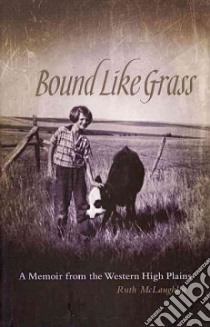Bound Like Grass - 9780806141374
Un libro in lingua di McLaughlin Ruth, Garceau Hagen Dee (FRW) edito da Univ of Oklahoma Pr, 2010
- € 20.00
- Il prezzo è variabile in funzione del cambio della valuta d’origine
"In this beautifully written but stark account of one ranching family's ties to the land, Ruth McLaughlin refutes the romantic myths that have distorted our view of the agrarian past. I wept as I read Bound Like Grass, out of sympathy but also in admiration of the strength and clasrity of vision Ruth brings to these pages." Mary Clearman Blew, author of Bone Deep in Landscape: Writing, Reading, and place
"With unshrinking honesty and clear-eyed retrospecgtion, McLaughlin examines the evolution of an eastern Montana dryland farm through the prism of her own family. Where the popular Little House on the Prairie mythology leaves off, her book takes over, documenting the harsh reality of life in an unforgiving landscape, the sort of `happily ever after' counterpart that seldom makes it to print. Her voice is quiet, authentic, and respectful, even as she asks the hard questions and explores the hard truths." Judy Blunt, author of Breaking Clean
"A precisely honest story about survival on the short-grass plains of eastern Montana and the vast cost of endless endurance. As crops fail, children die or move away, and beloved spouses pass on, the souls of survivors grow increasingly armored. These lives are absolutely American, and profoundly significant. Ruth McLaughlin is to be equally congratulated for her candor and for her compassion." William Kittredge, author of Hole in the sky and The Willow Field
"What distinguishes this memoir from other homesteading narratives is its focus on the second and third generations, those who inherited the charge to make something of the land...In its insight and compassion for people bent by place and their own choices, McLaughlin's work is akin to Ivan Doig's This House of Sky. From the foreword by Dee Garceau-Hagen
At the start of this haunting Amemoir, Ruth McLaughlin returns to the site of her childhood home in rural eastern Montana. In place of her family's house, she finds only rubble and a blackened chimney. A fire has taken the old farmstead and with it ninety-seven years of hard-luck memories. Amidst the ruins, a lone tree survives, reminding her of her family's stubborn will to survive despite hardships that included droughts, hunger, and mental illness.
Bound Like Grass is McLaughlin's account of her own---and her family's---struggle to survive on their isolated wheat and cattle farm. With acute observation, she explores her roots as a descendant of Swedish American grandparents who settled in Montana at the turn of the twentieth century with high ambitions, and of parents who barely managed to eke out a living on their own neighboring farm. Her parents were ill-equipped to deal with the challenges of raising four children, two of whom---Ruth's sisters---were disabled. The troubled lives of these two sisters were perhaps her family's most painful legacy.
In unvarnished prose, McLaughlin reveals the costs of homesteading on such unforgiving land, including emotional impoverishment and a necessary thrift bordering on deprivation. She evokes the slow rhythm of her family's 1950s rural life, attuned to crop cycles, the tending of animals, and Sunday dinners at her grandparents' house. In a life of recurrent hunger, McLaughlin recalls, the family would come together to eat, and "something mean... was suspended," as she and her siblings devoured meals of bologna and frankfurters, and even sour milk when the cows ate flowering biscuitroot.
Yet in this bleak world, poverty also inspired ingenuity. Ruth learned to self-administer a fashionable razor haircut, ignoring slashes to her hands; her brother taught himself to repair junk cars until at last he built one to carry him far away. Ruth also longed for a richer, brighter life, but when she finally departs, she finds herself an alien in a modern world of relative abundance. While leaving behind a life of hardship and hard luck, she remains bound---like the long, intertwining roots of prairie grass---to the land and to the memories that tie her to it.
Informazioni bibliografiche
- Titolo del Libro in lingua: Bound Like Grass
- Sottotitolo: A Memoir from the Western High Plains
- Lingua: English
- Autori : McLaughlin Ruth, Garceau Hagen Dee (FRW)
- Editore: Univ of Oklahoma Pr
- Collana: Univ of Oklahoma Pr (Hardcover)
- Data di Pubblicazione: 08 Ottobre '10
- Genere: BIOGRAPHY and AUTOBIOGRAPHY
- Argomenti : Farm life Montana Poor whites Montana Biography
- ISBN-10: 0806141379
- EAN-13: 9780806141374


